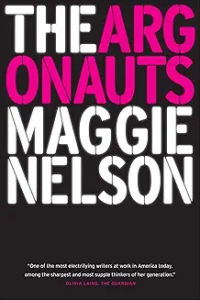The Argonauts by Maggie Nelson 2015
Frankly, I’m not quite sure what to make of this book after having read it carefully from cover to cover. To give you some idea of why, here’s the entire first paragraph: “October, 2007. The Santa Ana winds are shredding the bark off the eucalyptus trees in long white stripes. A friend and I risk widowmakers by having lunch outside , during which she suggests that I tattoo the words HARD TO GET across my knuckles, as a reminder of this pose’s possible fruits. Instead the words I love you come tumbling out of my mouth in an incantation the first time you fuck me in the ass, my face smasehd against the cement floor of your dank and charming bachelor pad.”
Okay. Welcome to Maggie Nelson. In addition, the person doing the deed is named Harry and is the father of their son, Iggy. That sounds straightforward, but Harry is also a transsexual who later in the book undergoes bilateral mastectomies and testosterone injections. Go figure.
Along the way, Nelson does some fine writing about the female role, sexuality, birth and motherhood, and the politics of 2015 America, arguing in each area for the rejection of dualism, the forced division of the world in to men/women, gay/straight, we/they, Black/White. The title derives from the Argonauts who were the sailors on Jason’s ship, the Argo in search of the Golden Fleece. The Argo is often described as the first ship to sail the sea. As the Argo aged, planks in the deck and body of the ship were replaced until eventually, the original whole ship had been replaced leading to the question as to whether the Argo was still the Argo if over time every plank had been replaced. If something is so changed that it no longer has any of the original material, is it still the same thing?
This metaphorical question is applied subtly by Nelson to the issues of gender fluidity, pregnancy, mother and child, and our own growing up and then growing old bodies. Are we still who we were and if not, who was that and who are we now? Nelson draws upon her creative mentors, Edie Sedgwick and Annie Sprinkle, the latter featured in the show we saw at the Tate Modern in March about Leigh Bowery and the former a key part of Andy Warhol’s NYC studio. She also praises the child psychologist Donald Winnicott, the originator of the term, the ‘good enough mother’ and the creator of the ‘traditional object’ concept.
In short, this was a challenging book for this aging, straight, white guy, but as the reviewer in the 2015 Guardian wrote:“Let’s start with an introduction. Maggie Nelson is one of the most electrifying writers at work in America today, among the sharpest and most supple thinkers of her generation.”



